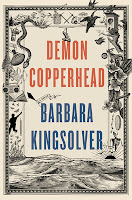Another year, another top-books roundup.
I only read 48 books this year (vs 56 last year), but it has been super-busy year. For those interested, activities included breaking my foot (boo), vacationing in Mongolia (yay), extremely expensive gum surgery (more boo), and visiting friends around the country (more yay). It also included a huge variety of freelancing projects, from ghostwriting a nonfiction book to editing a multi-million-dollar grant. I'll say one thing for freelancing: it's never dull.
In between all of the work and life shenanigans, I read. So, from the 48 books I read in 2023, here — in no particular order — are my ten favorite.
Romantic Comedy This is: a romantic comedy about comedy. (The protagonist is a writer for an SNL-type show who falls for the musical guest star.) I liked it because: I love pretty much anything Sittenfeld writes. And this was the perfect romance book because it fulfilled all the genre expectations and tropes while being smart and genuinely fun to read. (Sadly, some romance books can be a real slog.) Read this if you like: romantic comedies. Duh. | |
|---|---|
Piranesi This is: a strange, slim, dream-like book that takes its time and defies your expectations (whatever they may be). I liked it because: I have never read anything else like it. The world building takes a while, but if you can stay patient, the ride is worth it. Read this if you like: atmospheric books that aren't 12,000 pages long. And maybe Greek mythology (although I myself have no strong feelings for or against Greek mythology). | |
Heavy This is: a memoir about being overweight, male, and Black in America. I liked it because: Laymon manages to tell his story in a way that is intensely personal while also shining a spotlight on larger issues facing our country and the people in it. Read this if you like: intense memoirs about difficult but important subjects like race, education, mental health, and more. | |
Filthy Animals This is: a short story collection that includes a set of stories that intersect and further one another. Topics and themes include vulnerability, savagery, memory, sexuality, and things that we leave unsaid. I liked it because: each story is complete, except, of course, the ones that are connected. (This is rarer than you would think with short stories!) And it explored difficult themes in ways I found compelling and nuanced. Read this if you like: The Push and other novels and short stories that will make you occasionally wince or squirm a little. | |
The Secret Lives of Church Ladies This is: exactly what the title promises: a collection of stories depicting the secret lives of church ladies (as long as you interpret the "church ladies" part loosely, at times). I liked it because: it is clearly a collection of stories that belong together — rare in many short story collections! — and the writing is excellent. Philyaw has incredible empathy for the characters she writes about. Read this if you like: writers like Toni Morrison, who address Black realities head-on with no holds barred, but with a more forthright and less ephemeral tone than Morrison often takes. | |
 | Up to Speed: The Groundbreaking Science of Women Athletes Christine Yu This is: the one nonfiction entry on this year's list! I liked it because: it covers a topic that is extremely important to me — the research that exists (and does not) about female athletes — but which, to my knowledge, has never before been compiled in such a complete and approachable manner. Read this if you like: learning remarkable facts about the sports bra (it originated as two jock straps!), women's knees (and their considerably higher risk of ACL injuries!), and more. |
 | Notes on an Execution Danya Kukafka This is: a literary novel (not a thriller) about a serial killer that employs multiple perspectives and multiple timelines. I liked it because: it includes the killer's perspective, which helps build empathy for him without ever making him a sympathetic character. Read this if you like: multiple-perspective novels that deal with difficult topics. (Also you need to be ok with second-person POV, i.e., "you.") |
Demon Copperhead This is: a modern retelling of David Copperfield, set in opioid-riddled Appalachia. I liked it because: it's written by Barbara Kingsolver (a master) and examines heavy topics (trauma, foster care, poverty, abuse, drug addiction) through a realistic yet hopeful lens. Read this if you like: sprawling novels told by a complex yet likable character. | |
Tomorrow, and Tomorrow, and Tomorrow Gabrielle Zevin This is: a coming-of-age novel (where the characters keep coming of age all the way into their 30s) about friendship, love, and video games. I liked it because: it so perfectly demonstrates that humans are both knowable and unknowable, and there are many sides to every story. Read this if you like: Fates and Furies and other novels about complex characters struggling with the harsh realities of life and their relationships with one another. (Note: you don't have to be a gamer to enjoy this novel!) | |
What Are You Going Through This is: a short novel that somehow manages to fold in many challenging topics — climate change, terminal illness, failed relationships, and euthanasia to name a few. I liked it because: the writing is delicate yet tight, the topics are thought-provoking, and the narrator feels like someone I surely must know. Read this if you like: to sit with a character who feels like a real person as they go through a very difficult life experience. |
- Written by women (8 out of 10 titles!)
- Follow children or young adults as they develop
- Examine death












